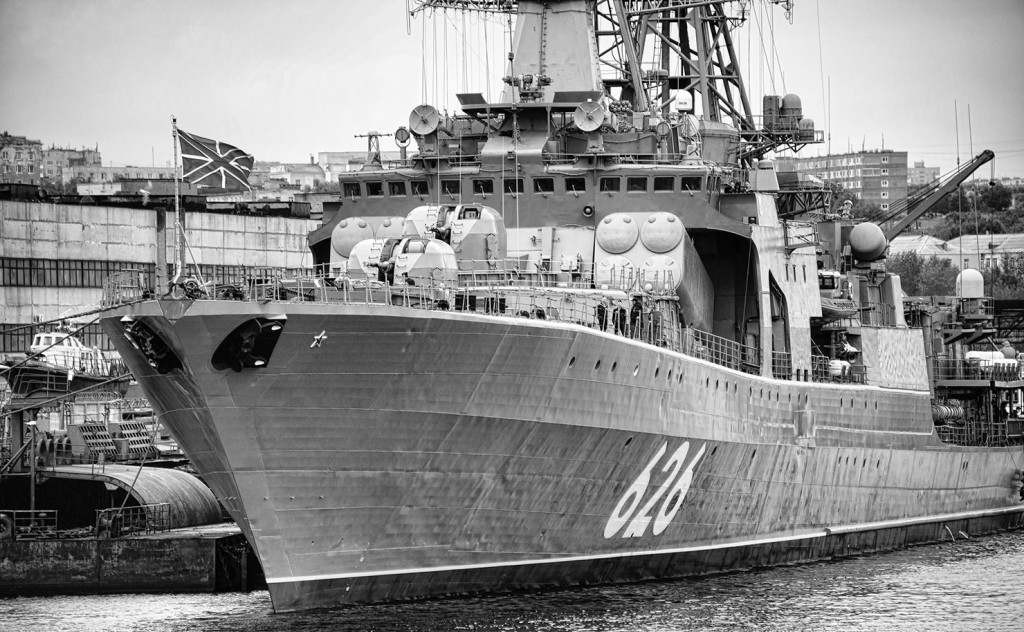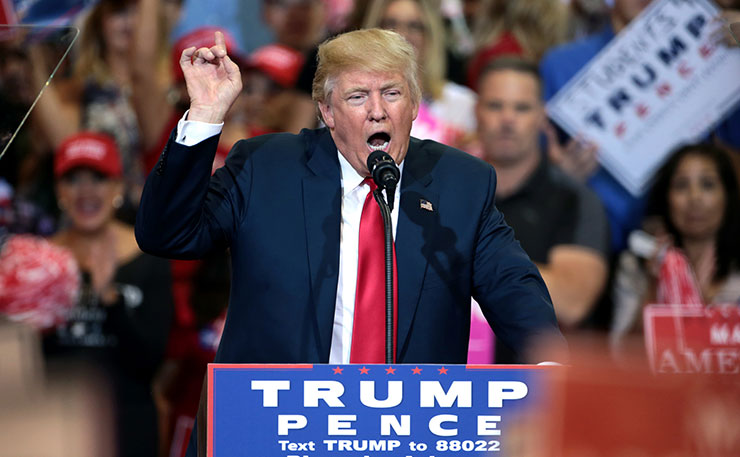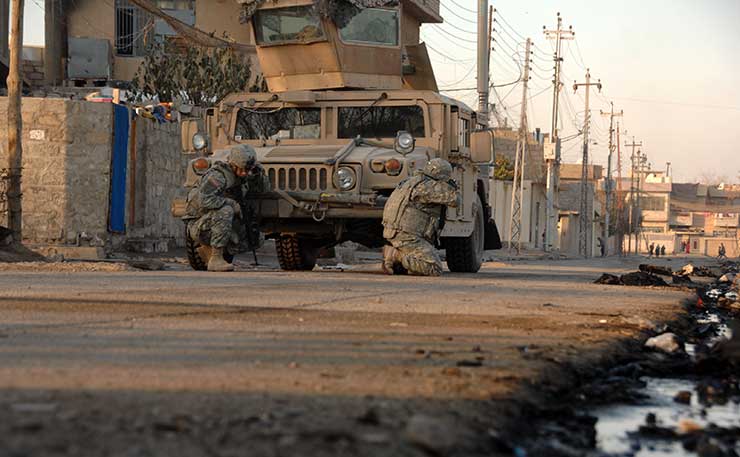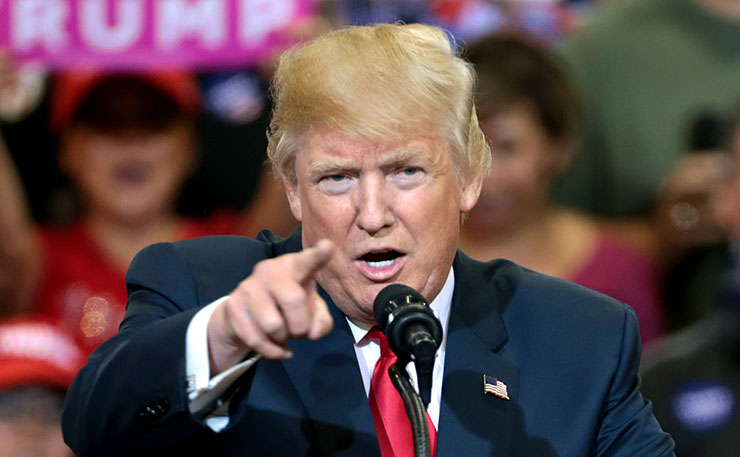Twenty-six years ago the Soviet Union collapsed under the weight of its military commitments, its oppressive surveillance bureaucracy, and its regime’s loss of legitimacy. That experience has lessons for Trump’s America writes Ian McAuley.
The Cold War, an arms race set against the backdrop of Mutually Assured Destruction (MAD), started and ended in Berlin.
Its start was the Soviet Union’s blockade of Berlin in 1948, followed a year later by the first successful Soviet test of a nuclear bomb. Its end, or at least the beginning of its end, was the fall of the Berlin Wall in 1989, followed two years later by Mikhail Gorbachev’s announcement of the Soviet Union’s dissolution.
America’s Republicans, and the political right throughout the world, portrayed the Soviet Union’s collapse as a victory of capitalism over socialism. Francis Fukuyama even said it heralded “the end of history”.
But the Soviet Union had been “socialist” in name only. Socialist idealism had died with Stalin’s rise in 1929, and the country rapidly morphed into a class-stratified society, with a chasm between the privileged class enjoying the spoils of “nomenklatura” and the masses living in miserable conditions and under the oppression of a surveillance state.
A more compelling explanation for the Soviet Union’s collapse is the economic burden of its military and security apparatus.

The Soviet Union had been on the victorious side in Europe’s war of 1939 to 1945, but it paid a huge price. Hitler’s Wehrmacht had laid waste to the countryside all the way to the edge of Moscow. In re-taking its territory, and pushing all the way into the German heartland, the Red Army did the heavy lifting in defeating Nazism. While America provided the armaments for the victory, the Soviet Union provided the infantry.
In that war the United States and Britain between them lost one million lives, while the Soviet Union lost 25 million lives. At the end of the war the Soviet Union still faced its enemies along long land borders, while America and Britain went back to their better-secured territory. The Soviet Union’s concern for security, and a certain level of paranoia, were both understandable.
Some scholars in American military academies claim that the US-Soviet arms race had been a deliberate American strategy. America was able to sustain that arms race without damaging its own economy or living standards, while the Soviet Union was so weakened by the war, and had started industrialisation so late, that it could keep up the race only by denying resources to the civilian sector, ultimately leading to collapse.
Notwithstanding the 20/20 hindsight in such a claim, the argument that military expenditure saps a domestic economy is compelling. When President Eisenhower in his farewell address warned of the power of the military-industrial complex he was referring not only to its political influence, but also to its demands on the US economy. Both the US and the Soviet Union had their own influential military-industrial complexes, each with an incentive to over-state the strength of the other side.
Whatever the driver of the arms race, in the post-war era the Soviet Union notched up some impressive achievements. In the space race it got an early lead on the US, and it developed advanced military technology. At the same time the civilian population was left impoverished, and not even the most severe censorship and restrictions on travel could hide the reality that in terms of attending to its people’s needs, the US and its European allies were doing so much better. By the late 1980s the regime had lost any vestiges of legitimacy.
As contrasting examples to the experience of the Soviet Union, in the same post-war era Japan and Germany, the defeated powers with restricted military capacities, thrived.
The Soviet Union’s demise carries a clear history lesson about the risk of diverting too many resources to military and security purposes and neglecting the welfare of the majority. But have Donald Trump and his supporters in the Republican establishment learned that lesson?

Trump is not only urging America’s NATO allies to increase their defence spending. He is also pushing through Congress a massive increase in US military spending. Last year the US spent just over $US600 billion on its armed services, four times the amount of the world’s second-highest spender (China), and dwarfing every other country’s spending.
Military spending is only part of America’s allocation to security. Trump’s border wall with Mexico will cost around $US30 billion (more than Australia’s annual defence budget), and that’s on top of around $US50 billion for regular expenditure on the Department of Homeland Security.
These are only the federal fiscal outlays. They don’t include costs borne by state governments and by the private sector – policing, security guards on public and private buildings, increased costs of air travel and so on.
And that’s not to mention the cost of a general atmosphere of fear and mistrust. The Soviet Union used the KGB’s blunt and brutal techniques to enforce compliance. Even though America drifted towards Soviet-style authoritarianism in the McCarthy era, its instruments of social control are more subtle – as one Russian migrant explained to me they are more akin to Huxley’s Brave New World than to Orwell’s Nineteen Eighty-Four.
At first sight one may argue that America is prosperous enough to afford this spending. But it is coming from an already stressed public sector, stressed further by Trump’s tax cuts. America’s taxes, at 26 per cent of GDP, are almost the lowest among all “developed” countries. (The average tax revenue among other prosperous ‘developed’ countries is 36 per cent of GDP, and even Australia manages 28 per cent of GDP.)
Even though America is running a high federal fiscal deficit, at 3.5 per cent of GDP, its public services are poor, and its distributive welfare programs are miserable. Trump’s infrastructure stimulus may do a little to patch up the country’s crumbling roads, but it will do nothing to fix its impoverished schools and ramshackle public transport. And his tax cuts will worsen the country’s already skewed distribution of income.
With such a loose fiscal policy – described by The Economist as “poorly designed and recklessly large” – it’s inevitable that there will be a rise in interest rates. Indeed, the stock market jitters of the last two weeks have been caused by such expectations. Coming off a low base, any rise in interest rates will have a strong effect on already highly-indebted households. Trump’s fiscal extravagance is giving the country a sugar hit, but it will have terrible consequences a few years on.

To come back to the Soviet Union, in 1957 no doubt Soviet citizens came out of their apartments at night to marvel at Sputnik 1, their country’s and the world’s first satellite. Over the following years, as they saw more and more impressive displays of military might at the May Day parades, they probably took pride in their government having made Russia “great again”, overcoming the snobbish 19th century portrayal of Russia as “backward”. They surely celebrated their country’s achievements in arts and sports.
But these achievements did little to improve their daily lives, or to lighten the yoke of the surveillance state. As they compared their lot with the lifestyles enjoyed by the Party elites, resentment grew.
Those Soviet citizens got only occasional glances at how people lived in other countries – impressions conveyed by those few who had permission to travel, or by stories from relatives who had migrated.
Americans in 2018 however, have many opportunities to see how the rest of the world lives. They can ride on fast trains in China; they can wander through European cities and hardly see a beggar on the streets; they can go all over Tokyo or Singapore without fearing for their lives; they can talk to young people in Germany or the Netherlands who have no notion of “student debt”; they can go to Norway, the world’s richest country, and hardly see the flashy vulgarity of luxury cars. And when they travel they don’t even have to carry handguns. Even those who cannot afford to travel still have the Internet’s window to the world.
When will American citizens come to realise just what is meant by “making America great again”?
Donate To New Matilda
New Matilda is a small, independent media outlet. We survive through reader contributions, and never losing a lawsuit. If you got something from this article, giving something back helps us to continue speaking truth to power. Every little bit counts.




